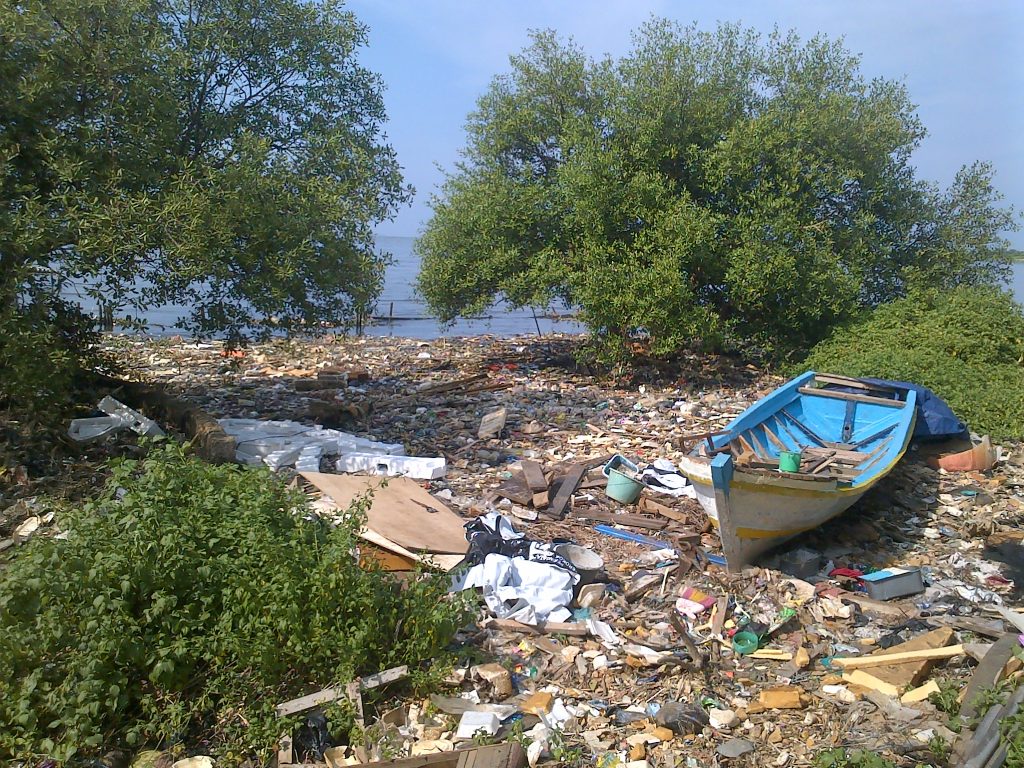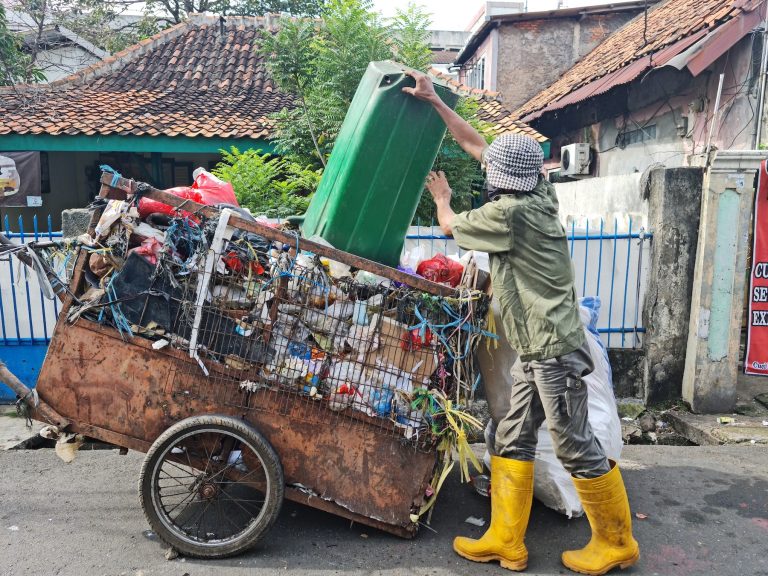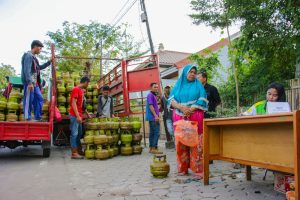by: Syahriza Alkohir Anggoro*
In 2022, the United Nations Environment Assembly adopted a new resolution laying the first groundwork toward a new legally binding international agreement to end plastic pollution. The treaty will contain ambitious targets covering every stage of the plastic life cycle, including introducing restrictive measures against the production and consumption of single-use plastics, the development of a framework for coordinated national action plans, and regional and international cooperation. While the progress of the agreement remains to be seen, from the very beginning, the key to its success clearly relies on the engagement of all parties.
In this regard, what role can the courts play? As has been well documented by the Plastic Litigation Tracker, there have been many success stories from plastic waste-related legal actions in the Global North and Global South in recent years. These suits can take the form of citizen lawsuits or class actions in various types of courts, usually targeting governments or producers. In the future, more lawsuits are expected as the negative consequences of plastic pollution on the environment and human health continue to emerge.

Plastics in the courtroom
Global South countries such as Indonesia are among the world’s significant contributors to plastic waste, therefore courts here can provide valuable lessons on how judicial power contributes to combating this Anthropocene crisis.
The emerging plastic waste litigation in Indonesia demonstrates the involvement of the courts in several ways. First, litigation can arise at the initiative of industry associations to thwart a regulation issued by the government. As has been reported by the Ministry of Environment and the Diet Kantong Plastik advocacy campaign, as of 2025, there are more than 100 regions in Indonesia that have regulations on restricting or banning single-use plastics to varying extents. Among the most prominent, for example, are regulations on single-use plastic bans and restrictions on the use of plastic bags in Bali province and Bogor city. In addition to environmental reasons, these policies are economically necessary, given these regions’ respective profiles as national and international tourism destinations that are heavily dependent on a plastic-free environment.
In 2019, two industry associations and several disgruntled individuals initiated a judicial review of the regulations at the Supreme Court. They claimed that the regulations had been made arbitrarily and without a clear national legal basis. The plaintiffs also claimed that the regulations potentially violated their economic rights. This, in turn, affects the investment climate as well as regional economic growth. For the plaintiffs, the main problem lies not in the plastic material itself, but in poor waste management and low public environmental awareness.
However, the Supreme Court rejected the plaintiffs’ arguments in both cases, stating that the regulations were intended to ensure the fulfilment of the human right to a good and healthy environment. This means that the court has recognised the causality of environmental sustainability as a prerequisite for the enjoyment of human rights. The Supreme Court also emphasised that the regulation of single-use plastics is entirely the prerogative of local governments in the context of governance decentralisation. In other words, although the central government itself will only enact its nationwide ban on single-use plastics on Jan. 1, 2030, more aggressive initiatives at the preexisting local level are legally valid solely because of local governments’ obligation to maintain the environmental integrity within their jurisdictions.
The second way in which plastic waste litigation arises can be found in civil lawsuits against the state for negligence. In a citizen lawsuit against the city of Pekanbaru, the plaintiff won the case by arguing that the local government had failed to address plastic waste. The plaintiff argued that the city of Pekanbaru had committed unlawful acts by allowing open dumping landfills, not implementing waste reduction, not allocating a budget for waste management, and not building a sufficient number of 3R-based (reduce, reuse and recycle) temporary storage capacity. As a result, the local government’s negligence has caused flooding, bad odours in residential areas, and other potential losses that affect the enjoyment of the right to a good and healthy environment as guaranteed by the Constitution.
The Pekanbaru District Court granted the plaintiff’s entire motion by ordering the defendant to adopt a waste management policy, develop infrastructure and facilities, develop a waste bank, and include awareness-raising to the public. Most importantly, the court also went a step further by ordering local authorities to issue regulations on single-use plastic restrictions targeting supermarkets and modern retail stores.
This verdict is a revolutionary precedent, given that current national laws do not require restrictions or bans as nationally binding orders. This means the court is encouraging local governments to take precautionary measures with the application of stricter legal standards beyond the “half-hearted approach” their counterparts in the central government have been taking toward single-use plastic pollution.
Finally, plastic waste litigation may emerge as part of the advocacy strategy of the environmental movement. As in other cities in Indonesia, Bali’s anti-plastic activism has grown rapidly with various programs such as campaigns, drafting petitions to state authorities, and conducting waste audits to find out which brands of product packaging are littering beaches and rivers. In 2023, Yayasan Pemerhati Lingkungan dan Hutan Indonesia, a nonprofit foundation, filed a class action in Denpasar District Court against bottled water producer Danone Indonesia as defendant, with the Ministry of Environment, Ministry of Tourism, Ministry of Home Affairs, and the Bali provincial government as co-defendants.
The plaintiff claimed that Danone Indonesia had committed an unlawful act for not implementing the extended producer responsibility program stipulated by Ministry of Environment Regulation 75/2019. Against the co-defendants, the plaintiff argued that they failed to utilise their authority, duties and supervisory responsibilities granted by law against polluters. They also stated that the Bali provincial government had not maximised the implementation of the single-use plastic ban, resulting in the continued leakage of plastic waste from land to the marine environment.
In this legal battle, the plaintiff asked manufacturers to conduct business in a sustainable manner by considering the potential plastic waste generation from each life cycle. This could be done, for example, by reducing the use of plastic bottles as product packaging and investing in alternative packaging technologies. To strengthen this argument, Yayasan Pemerhati Lingkungan dan Hutan Indonesia used evidence from the river monitoring group Sungai Watch’s research on the condition of Bali’s rivers, which are polluted with Danone Indonesia’s plastic bottles. This, they said, had the potential to undermine Indonesia’s efforts to meet its 2030 Sustainable Development Goals targets.
Unfortunately, the panel of judges at the Denpasar District Court declared the lawsuit inadmissible on the grounds that the plaintiff lacked legal standing. Procedurally, the plaintiff’s claim to be an organisation representing environmental interests was unfounded as it had not met the requirements stipulated by existing regulations. While the Sungai Watch report also mentioned other polluting companies, the lawsuit seemed to be misdirected (error in persona), given that it was only directed at Danone Indonesia, and consequently, was considered “lacking parties” (plurium litis consortium) or formally defective. The defendant also asserted that Danone Indonesia, as a legal entity, was in liquidation since 2022, and that, therefore, the request made by the plaintiff could potentially be unenforceable if granted by the court.
Despite the fact that the judges’ reasoning was legally sound, the court’s rejection was a setback from the standpoint of anti-plastic activism. In this case, the court clearly had not considered the merits of the petition: despite the compelling evidence that environmental activists in Bali — and indeed across Indonesia — have long and regularly conducted waste audits with consistent findings. Meanwhile, in the Northern Hemisphere, parent company Danone is facing a similar lawsuit, including at its headquarters in France, on the grounds that it has failed to comply with its legal obligations on plastic pollution.
In the future, Indonesian anti-plastic activism may need to adapt to the legalistic tendencies of the courts to improve the success of litigation strategies. This should also be supported by more solid arguments, informed by the best available science, about the potential barriers that plastic pollution poses to the enjoyment of human rights and its impact on the environment and all non-human species on our planet.
How should the court act?
The cases that Indonesian courts have handled so far can provide lessons on how judicial power is developing a legal sensibility to the complexity of the threat posed by plastic pollution. While the end results vary, courts can engage in this struggle: telling government authorities what they should do, or penalising producers or governments for not fulfilling their obligations. When the state itself neglects its obligations regarding the prevention and mitigation of plastic pollution, or conversely, when corporations express dissatisfaction with certain policies that hamper their business interests, activists channel their fighting tactics through legal channels, making the courtroom a key battleground forum to defend public and environmental interests. Judges may have to transcend legal barriers to prioritise environmental interests, ensure the human right to a good and healthy environment is fulfilled, and help defend existing progressive initiatives from legal attacks by plastic corporations.
With high hopes for the ratification of the global plastic treaty this year, where Indonesia also seems to be quite active in the negotiations, plastic waste litigation may emerge more massively and involve various parties. Due to the complexity of plastic pollution threats, it is safe to say that litigation is likely to be based on intersectional claims (such as climate change, hazardous chemicals in plastic materials, etc.). While this assessment is optimistic, it should be noted that courts, both in Indonesia and elsewhere in the Global South and Global North, also have an erga omnes (“towards all”) obligation to safeguard our planet’s ecosystems for current and future generations, and as such, should be involved in any efforts to end plastic pollution.
*The author is a lecturer at the Faculty of Law, Brawijaya University, Indonesia, where he teaches constitutional and environmental law.
This article was first published in Mongabay.com on September 30, 2025, with the title: Can courts combat plastic pollution? Lessons from Indonesia (commentary)
Banner image: A cleaning worker collects household waste. 6 April 2021. nsh/tanahair.net















